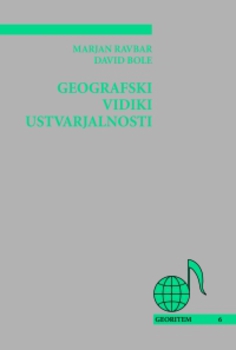Geografski vidiki ustvarjalnosti
Creativity is gaining in its importance within the knowledge society. Studying these complex dimensions and their long-term consequences for the economic and social progress was the object of abundant social studies n the past. But the transformation of the landscape due to creative influences, as one of the most important factors regarding structural changes in modern society, is not well represented in Slovenian geographical literature. The booklet at hand is the first attempt of establishing some geographical–developmental factors, which are encouraged by various forms of creative human activities. The geographical dispersion of human potentials is one of the key generators of creativity and social development. Some important socio–economic effects and regional disparities in the region are also in correlation with the aforementioned factors. We will try to explain some of them within a critical research view and within the form of the available space and on the other hand also show some new dimensions of social geography as a way of challenging future detailed discussions.
The introductory part of the discussion focuses primarily on the geographical aspects of creativity in the globalized world and the changed paradigm about developmental factors of progress and developing new, contemporary geographical contents. The main focus is on the basic characteristics of economic and socio-geographical transformation of the society, which is embodied by the creative environment as the main factor of modern social progress. In correlation with aforesaid characteristics is also the competitiveness of vast geographically united areas in the setting of globalisation and the established role of creative environment as the main modern developmental factor. Within the creative environment the main focus is made on spatial influences and consequences of competitiveness, mostly by ''the new tertiarisation'' and the geographical aspects of creativity. We tackle the distribution of creative potentials and their effects on the technological progress as developmental accelerator of competitiveness. The altered conditions consequently influence the functional dispersion of furnishing cities with social infrastructure, which is necessary for the existence of creative environment, especially with economic links, accelerating of research and complementary activities. Furthermore, we want to show the correlation between research and economic progress. A special chapter focuses on establishing concepts of the society of knowledge (case studies) and on the recommended concept of coinciding between the cooperation and competitiveness among geographical areas (city regions). Final chapters are focused on analytical representation of the level of creativity and its spatial dispersion in Slovenia, on the meaning of innovativeness, on the social and human capital and the possibilities offered to us by modern challenges in the united Europe.
Downloads

Series
License

This work is licensed under a Creative Commons Attribution-NonCommercial-NoDerivatives 4.0 International License.
